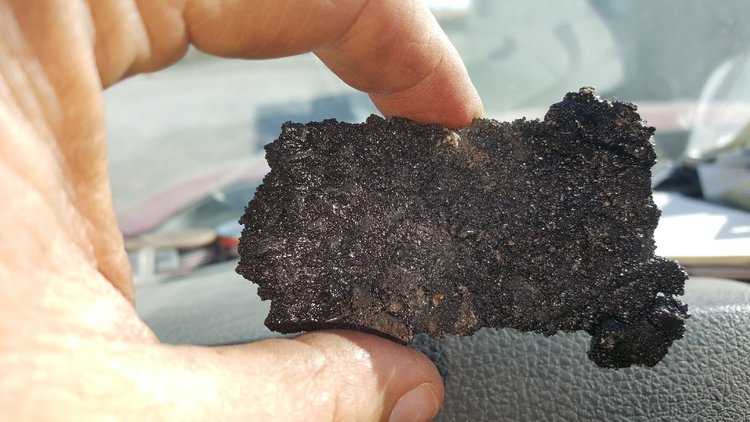To Recycle or Not To Recycle?
The facts about Recycled versus Virgin Mix Asphalt

As an asphalt paving contractor part and parcel to doing our work is the asphaltic concrete material that is placed on the roads or parking lots we pave. In most projects the material is the most expensive portion. Given that fact, the question becomes, “How do we save money on the material in order to pass along those savings to our clients and ourselves?”. In the asphalt world, there are actually many options that a client has when specifying asphalt material for their projects. These options can increase or decrease the material price, directly affecting the final cost of the project. One of those options is selecting either recycled or non-recycled (virgin) asphalt.
Read on to discover a little about these options and how they can affect your project!
What is asphalt?1
Asphaltic concrete (Hot Mix Asphalt) is composed of an asphalt binder (bitumen) and aggregate (rock), that when heated and mixed forms a durable, flexible surface for which to operate motor vehicles on. Bitumen is a derivative of the oil refining process, but also can be found naturally in the earth (see La Brea tar pits in Los Angeles).Asphalt in the United States is mostly used in the production of asphaltic concrete for the purposes of roadway construction. Being a derivative of oil, asphalt is a non-renewable resource. Being a non-renewable resource means that anything we can do to prolong the stores we have access to would be beneficial for long-term sustainability, among other reasons. Thankfully, the asphalt industry has pioneered a model of sustainability through the intensive recycling of asphalt pavements that can be used to make ‘new’ asphalt material.
Go Green
Historically, it was assumed that the best mixes of asphalt were derived from using virgin (new) asphalt binders during production. However, this notion has been challenged over the years by various studies and practical applications showing this may not be the case. In fact, studies have shown that asphalt is one of the number one recycled materials in the U.S.2 This is done by taking recycled asphalt millings (RAP) or old asphalt shingles (RAS) and mixing them back into a new batch, (along with fresh (or virgin) asphalt oil) and generating new product. These mixes are typically less expensive and make good use of old asphalt to create a more sustainable industry.

In light of this, the question is, “Do these mixes incorporating recycled materials perform on par or nearly as well as mixes using just virgin (new) asphalt?”. Fortunately, studies and field experience tell us, “Yes!”. A Federal Highway Administration report from 2011 states that, “... it has been determined that the performance of pavements containing up to 30 percent RAP is similar to that of pavements constructed from virgin materials with no RAP.”3 What this means to us is that, as a contractor, assuming the mix design is specified correctly and other conditions are met, we can be confident in using these types of mixes on your project. This means less cost with a similar quality level.
What should you do?
The next time you discuss an asphalt project with your asphalt contractor, be sure to bring up the asphalt mix design for the application. It isn’t always necessary to pay for virgin or new asphalt mixes when a recycled mix might do. If you have questions about this or other asphalt, concrete or railroad needs please contact us HERE! We have experienced staff to help navigate the finer details in your next asphalt project.
References:
- The Asphalt Institute. (2007). The Asphalt Handbook: MS-4, 7th Ed., The Asphalt Institute, Lexington, KY.
- Federal Highway Administration. (1993). A Study of the Use of Recycled Paving Materials: A Report to Congress, Report No. FHWA-RD-93-147, Federal Highway Administration, Washington, DC. Obtained from: https://nepis.epa.gov/. Site last accessed January 12, 2018.
- Federal Highway Administration. (2011). Reclaimed Asphalt Pavement in Asphalt Mixtures: State of the Practice, Report No. FHWA-HRT-11-021, Federal Highway Administration, Washington, DC. Obtained from: https://www.fhwa.dot.gov/publications/research/infrastructure/pavements/11021/11021.pdf. Site last accessed December 29, 2017.